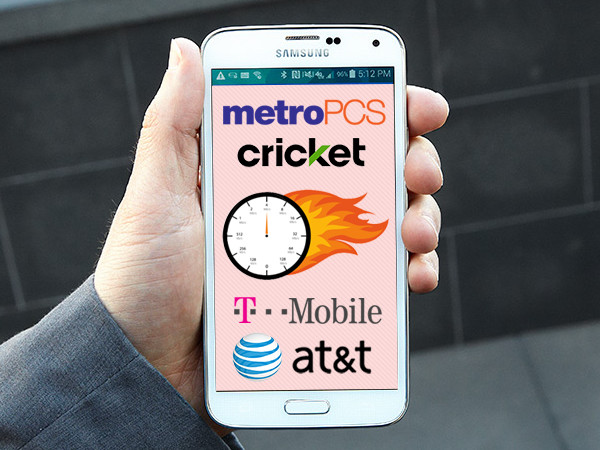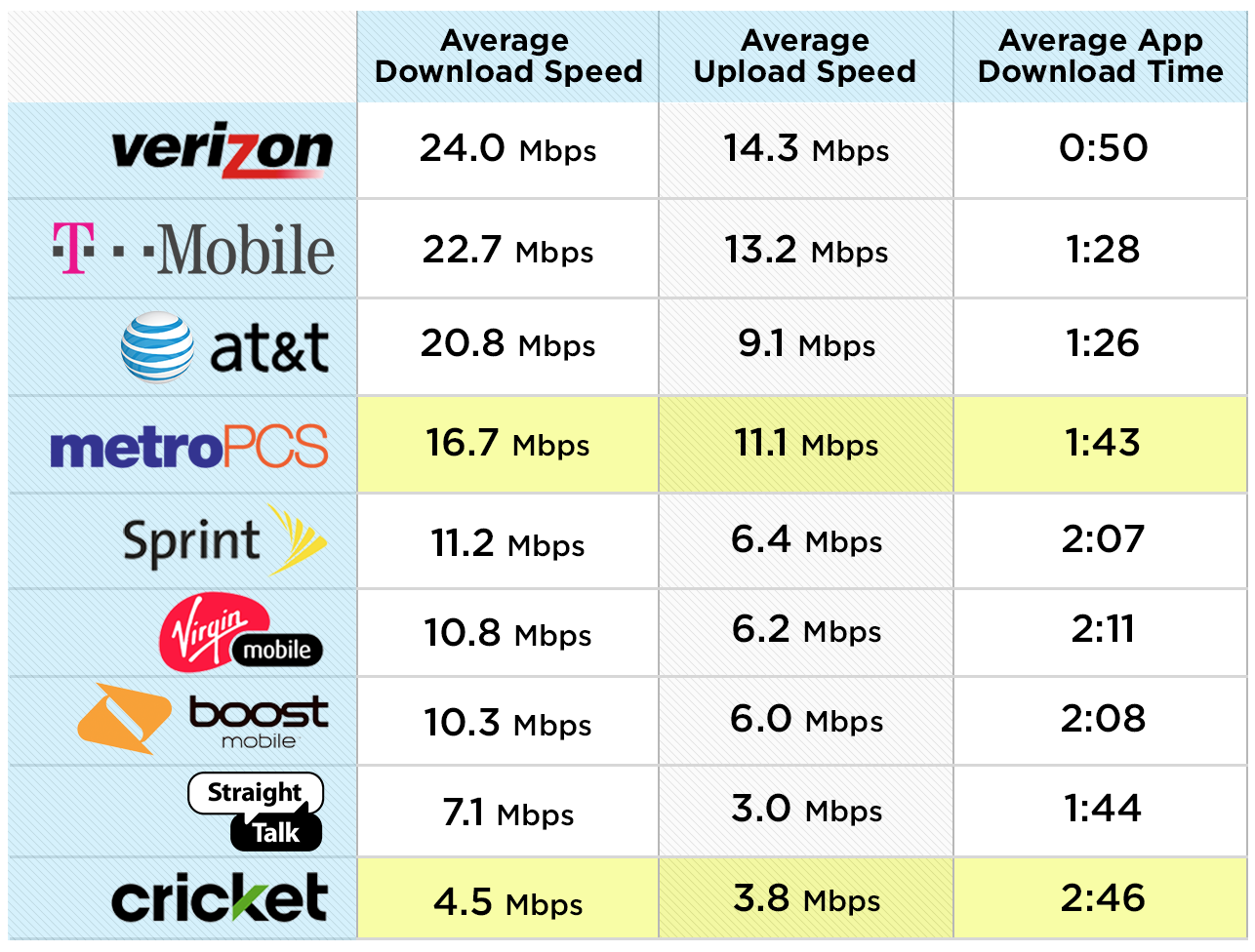Tested: Cricket, MetroPCS Slower Than Parent Networks
Our tests of wireless networks found that discount carriers like Cricket Wireless and MetroPCS don't match the speeds of their parent companies.


Update 9/8/15:After our initial round of testing, we discovered that one of our test phones for MetroPCS was not connecting to the carrier’s 4G network. We retested in the affected cities and have updated this story.
Specialty prepaid carriers promise subscribers low monthly rates and no contracts while also letting their customers connect over the networks of major wireless providers. But our testing of cellular networks around the country found that, in exchange for those low monthly rates, you're likely to get performance that lags behind what the larger carriers offer to their customers.
Take MetroPCS, a T-Mobile-owned prepaid wireless service, which uses its parent company's network. After testing network performance in six cities across the country, MetroPCS turned in the best performance of the five prepaid carriers we measured. MetroPCS recorded average download and upload speeds of 16.7 Mbps and 9.1 Mbps, respectively — strong results, but not quite up to the 22.7 Mbps down and 13.2 Mbps up we recorded using a T-Mobile phone in those same cities.

The difference was even starker for AT&T-owned Cricket Wireless, which recorded substantially slower speeds than its parent company, even though Cricket and AT&T use the same network. In our tests, Cricket tallied national download and upload averages of 4.5 Mbps and 3.8 Mbps, respectively. That's a far cry from the 20.8 Mbps down and 9.1 Mbps up that AT&T averaged.
MORE: Verizon Wins 2015 Nationwide 4G Showdown

Why Discount Carriers Are Slower
So, what's the reason for the slowdown? Carriers manage their networks, and subscribers to the host carrier get priority over subscribers to discount services.

"On top of the lower data speeds, most value brands have high-speed data limits, causing data speeds to be reduced after a specified threshold is reached each month," said Lynette Luna, principal analyst for the consumer group at market research firm Current Analysis. "These are network economic decisions to make up for the significantly cheaper service that carriers are offering via their prepaid brands."
Get instant access to breaking news, the hottest reviews, great deals and helpful tips.
"You get what you pay for," Luna continued. "High-end subscribers will always be the valuable customers for carriers, so they are going to get the better data rates."
The Carriers Respond
Indeed, wireless providers concede that this is exactly what's taking place. A representative for T-Mobile told us that the carrier offers a number of different services and partner brands to reach different customers.
"To differentiate them, we give T-Mobile customer data precedence over non-T-Mobile-branded services (including MetroPCS) when our network is presented with competing demands," the representative said via email. "In those rare times and locations where the network is heavily loaded, some customers may experience slower data speeds." MetroPCS details its network policies on its website, including the typical speeds subscribers can expect.
To be fair, the gap between MetroPCS and T-Mobile was narrow, and in some places, MetroPCS even bested its parent carrier. In New York, the two providers recorded identical upload speeds, in San Francisco and Seattle, MetroPCS had better upload speeds than T-Mobile.
It’s worth noting we arrived at these results, after having to retest in Los Angeles, Seattle and San Francisco, after the unlocked Samsung Galaxy S5 we brought in to a MetroPCS store was improperly setup so that it never connected to a 4G network. That, of course, raises another trade-off you may have to make when turning a discount carrier: spotty customer service.
We also found that having a more advanced phone didn’t necessarily lead to faster performance for MetroPCS. In our Los Angeles, Seattle and San Francisco retests, we took along a MetroPCS-supplied Galaxy S6 to verify our testing experience. (The Galaxy S5 we used as our default test phone for other carriers is not supported by MetroPCS, which also contributed to our initial problems with the results.)

In Seattle, the MetroPCS Galaxy S6 had a faster upload speed than the T-Mobile S5, but it’s average download speed of 40.9 Mbps was off the 55.9 Mbps average we recorded for T-Mobile. The T-Mobile S5 also outperformed the MetroPCS S6 in both Los Angeles and San Francisco. One notable exception: the MetroPCS was substantially faster in our app download test in Los Angeles and San Francisco while finishing 7 seconds slower than the T-Mobile S5 in Seattle.
As for Cricket, the gap between its performance and AT&T's likely arises because Cricket's performance is capped on AT&T's network. A representative for Cricket said that download speeds max out at 8 Mbps.
"While that is slower than AT&T's, there are a number of factors at play which can impact speed — many of which are beyond Cricket's control," the rep said. Like MetroPCS, Cricket outlines itsnetwork policies, including typical speeds, on its website.
Unlike MetroPCS, Cricket never approached AT&T's performance in any city where we tested.
Boost and Virgin Are Bright Spots (Sort of)
In our testing, Boost Mobile and Virgin Mobile — both subsidiaries of Sprint — recorded national averages that were quite close to Sprint's download and upload speeds, placing them in sixth and seventh place, respectively, overall out of nine carriers. Sprint averaged 11.2 Mbps down — just ahead of the respective 10.8 Mbps and 10.3 Mbps speeds Virgin and Boost recorded. Upload averages were similarly comparable — Virgin and Boost finished right behind fifth-place Sprint.

But those results could reflect the nature of our testing, which involved running Ookla's Speedtest.net app on a Galaxy S5 multiple times at six locations around a city and then averaging the results. We also downloaded Candy Crush Saga at each location for a real-world test of app download times. (Sprint's average time of 2 minutes and 8 seconds was a second better than Boost's and 3 seconds ahead of Virgin's average.)
Had we tested video streaming, however, the results might have told a different tale. At the time of our testing Boost and Virgin restricted video streaming to 3G speeds — something Sprint didn't do. The two prepaid carriers recently dropped that restriction.
Less Speed vs. More Savings
It's worth pointing out that performance isn't necessarily what draws people to these kinds of prepaid carriers. The main attraction is cost savings: Prepaid subscribers can get devices and plans from prepaid carriers that they're unlikely to get from the likes of T-Mobile, AT&T, Sprint and Verizon. MetroPCS, for example, offers 1GB a month of data for $30, whereas a similar plan at T-Mobile costs $20 more each month. For some users, that kind of savings is well worth the trade-off on performance.
Luna agreed that discount carriers' slower network speeds won't deter customers from considering prepaid providers. "Typically, a customer of a prepaid brand is not going to be a high-powered user," she said. "These users are more interested in price, and these data speeds are decent for their needs — not to mention, the value-priced LTE smartphones available."
And there's nothing wrong with prizing the bottom line above other factors. Just know what you're giving up in terms of network performance.
Philip Michaels is a Managing Editor at Tom's Guide. He's been covering personal technology since 1999 and was in the building when Steve Jobs showed off the iPhone for the first time. He's been evaluating smartphones since that first iPhone debuted in 2007, and he's been following phone carriers and smartphone plans since 2015. He has strong opinions about Apple, the Oakland Athletics, old movies and proper butchery techniques. Follow him at @PhilipMichaels.
-
lycos679 This is just my experience, but my speeds on metropcs are 27 down, 3 up, and 31 ping. The ping and upload are pretty bad, but I did test that when I had one or two bars and reception for all carriers is poor in my apartment complex.Reply
When I last tested my speeds - on my last phone - I think I averaged around 13-17 Mbs or so. I live in the Dallas area and usually have 4-5 bars outside when not under trees. The strong coverage is sporadic though.

